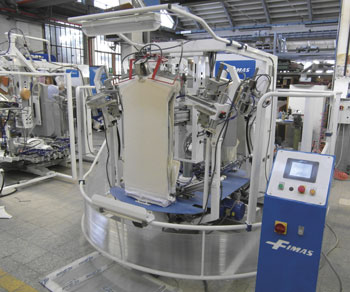Pneumatic Automation Without a Wrinkle
The level of automation on professional ironing machines – meant not only for small laundries and ironing services, but also for the largest industrial concerns in the apparel industry – increases, in a quest for an optimal balance between the quality of the ironing and profitability. With this objective in mind, F.I.M.A.S., a Macpi Group company, relies on the range of AirTAC pneumatic components for the movement of the machines built in the Vigevano factory and exported all over the world.
by Fabrizio Dalle Nogare
Designing and manufacturing ironing machines – just what F.I.M.A.S. (Fabbrica Italiana Macchine e Accessori da Stiro – Italian ironing machine and accessory factory) has been doing incessantly since 1986 in Vigevano (near Pavia) – means first and foremost being on the constant lookout for an optimal balance between the (nearly) perfect quality of items ironed by hand and the profitability which a professional or industrial activity demands. Users of F.I.M.A.S. machines include small laundries and ironing facilities, but also larger industrial laundries. All these concerns may not neglect such concepts as productivity and profitability, and automation and technology represent a great opportunity for them. Walter Cividini, besides being the Managing Director of the Lombardy-based company, is also the guardian of its history, having taken part in its foundation. His knowledge of this unique segment is hard to match. “For over thirty years we have been manufacturing our machines with the aim of achieving the optimal structure – he told us before taking us to the show-room and successively to the factory -. Our machines cover about 90% of the types of items which require ironing and our technical office is capable of producing customised solutions for clients who express specific requirements. Shirts remain the item which drives forward the production volume for ironing facilities, which now more than ever need to invest in productive machinery to increase the amount of work one and, consequently, the revenues”.
Increasing production volumes by means of automatic machines
F.I.M.A.S. – part of the Macpi SPA Pressing Division, operating in the garment manufacturing industry – exports its machines all over the world: from Europe to the US, right up to Canada, North Africa, Russia and the Far East, where it si present with products branded as Macpi but manufactured in Vigevano. The share of exports on the total of machines produces is of almost 60%, while the remaining 40% is sold in Italy.
“Ironing machines must ensure a good quality in the garments’ ironing – Mr Cividini continued – which if need be can be refinished by hand. In some countries, such as the US or Canada, there are companies which iron 2,000-2,500 shirts a day, of course thanks to the introduction of automatic machines. In Italy, concerns on average deal with smaller volumes, let’s say, from 80 to 200 shirts a day, which could increase considerably using automatic machines. If you consider that a modern machine allows to iron as many as 30 shirts an hour, it is clear that the return on the investment is actually rather fast”.
An evolving segment
The F.I.M.A.S. show room, which relates visually the company’s history, allows us to understand immediately what was the impact of automation on ironing machines: from dummies for shirts or trousers to ironing boards, right up to pressing machines and steam generators.
“Up to 10-15 years ago machines were purely mechanical and it was necessary to act manually in order to position the clams, regulate the arms’ position or the height of the machine – Walter Cividini related -. Of course this was a considerable limit for a company’s productivity, especially when different types of garment were dealt with. The introduction of pneumatics, of electric cabling or the simplification of interfaces, now managed using intuitive touch screens, have been fundamental steps. An automatic machine may also be managed very easily by operators. Automation allowed an increase in productivity of at least 20-30%”.
Strong and reliable pneumatic components
Today, the movement of F.I.M.A.S. ironing machines is entrusted to the range of pneumatic components made by AirTAC, whose European branch is hosed by ATC Italia in Magnago: micro-cylinders, electro-valves, compressed air treatment groups, fluid valves and fittings are the products assembled on F.I.M.A.S. machines, even because they can comply with requisites which are important for machine of this kind. Some examples: resistance to high temperatures and friction or reliability even in environments characterised by the presence of steam. Besides cylinders are standard and therefore may be exchanged with products by other companies.
“The relationship between AirTAC and F.I.M.A.S. stems from the long-lasting personal acquaintance with Mr Cividini – Marco Biraghi, Managing Director of ATC Italia, explains – and is based on authentic values, such as fairness and respect between supplier and client. I am convinced that a supplier should indeed provide quality products but should also allow the client to be competitive on the market, even from a price standpoint”.
Fine-tuning warehouse stocks to clients’ demands
We mentioned the evolution of ironing machines over time, but automation component manufacturers also evolved. “In our case – Mr Biraghi added – the aim has always been clear: reducing the price of components, definitely not by selling off the product cheaply – such a solution would not allow AirTAC to invest in R&D to improve performances – but rather by aiming at constantly increasing the efficiency of production processes, stock management and shipment. As ATC Italia we worked hard during the past few years on the efficiency of the warehouse, which must necessarily consider the deep knowledge of the practical and daily demands of our clients. This allows us to fine-tune our warehouse stocks with the aim of providing on time the products which the clients need. This is what happens with F.I.M.A.S., willing and bold enough to try out new solutions with the aim of increasing productivity”.

